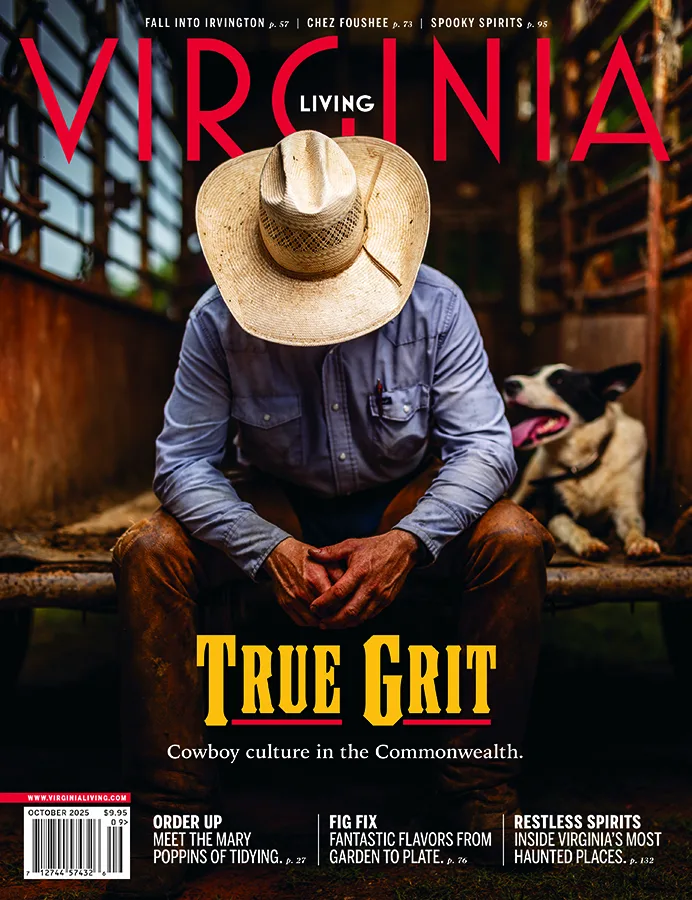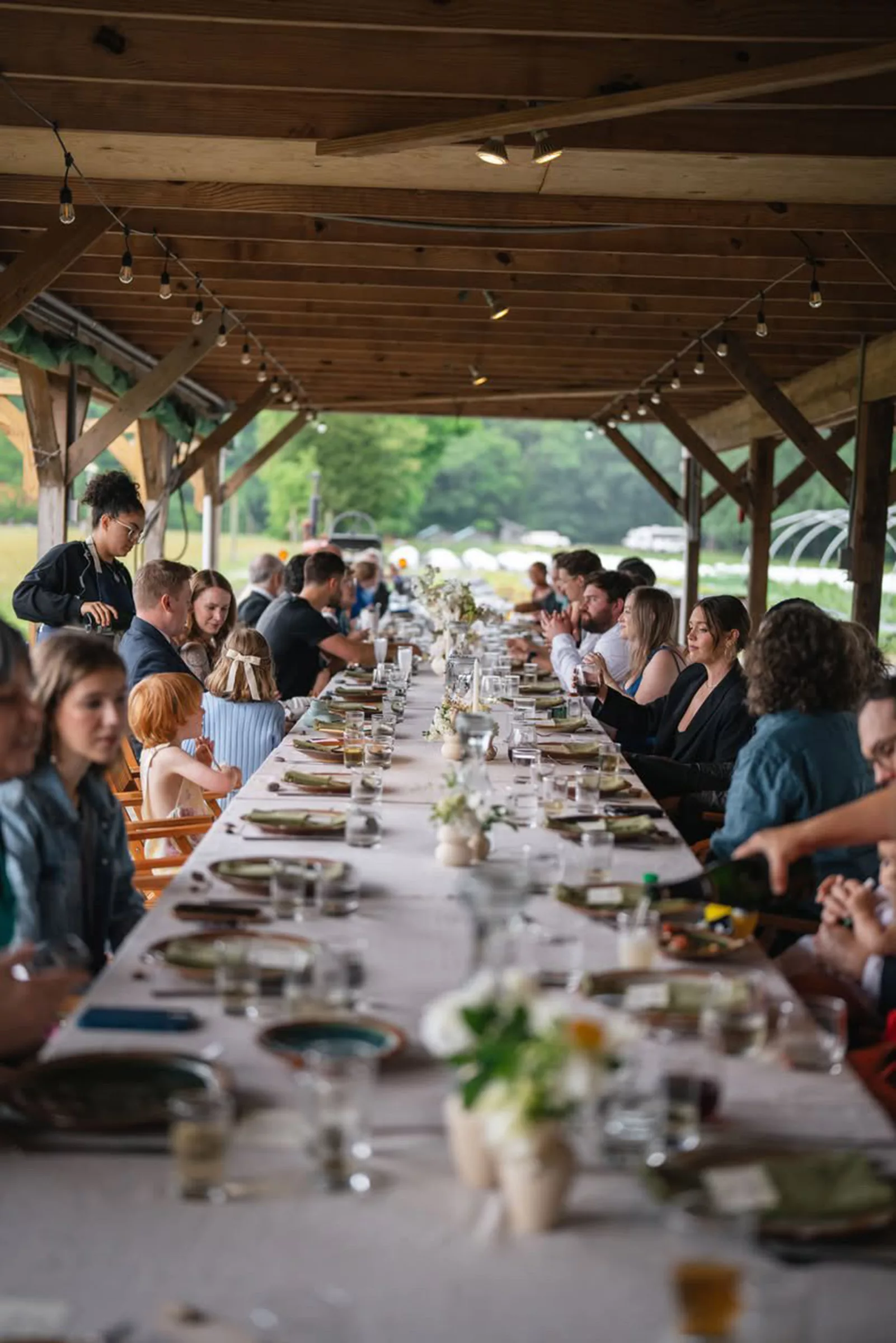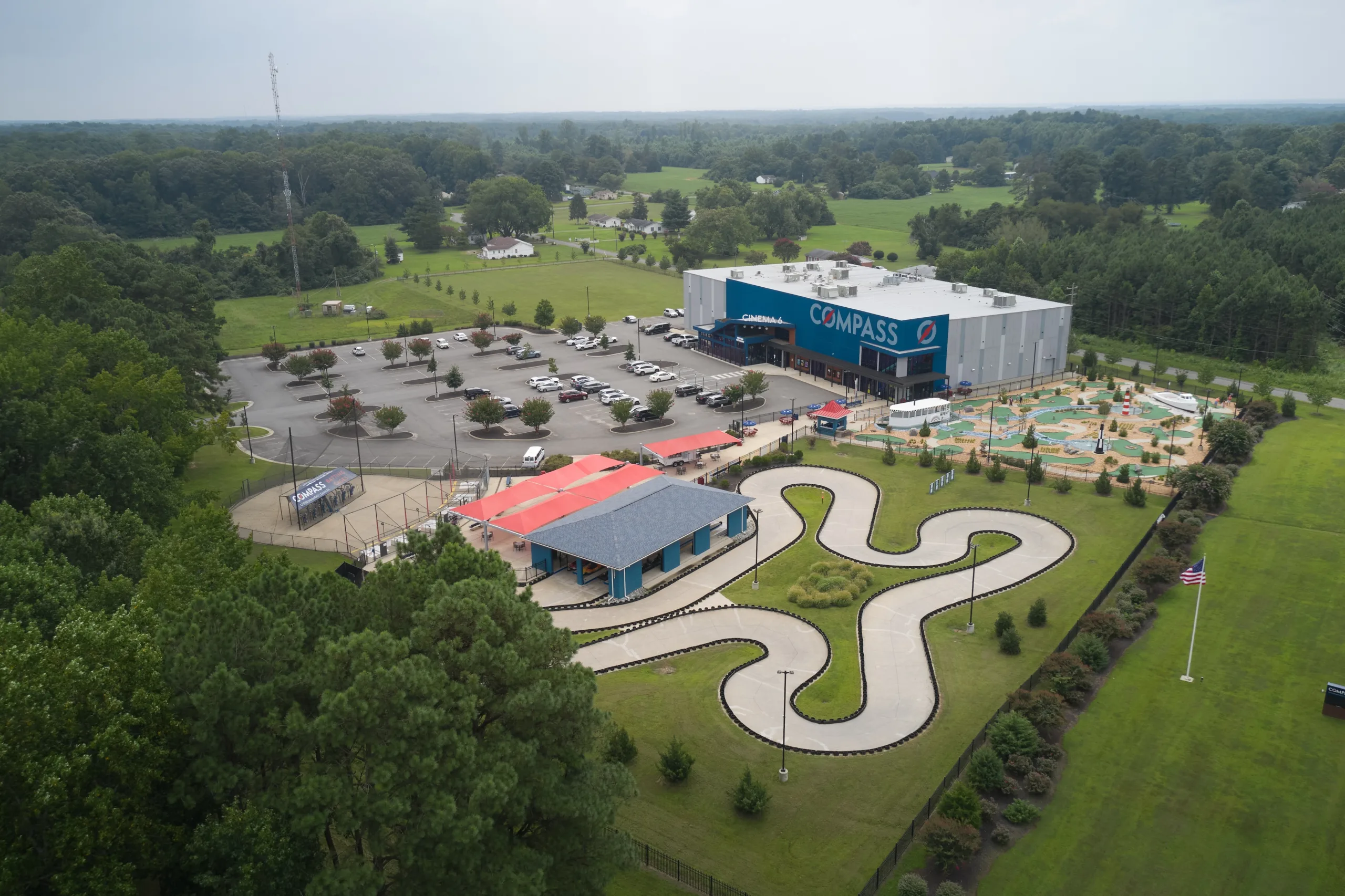Ian Newell wanted to create something meaningful, something people needed—like oxygen, water, or food. The first two, he reasoned, were already handled by nature and the utilities department. That left food.
The 38-year-old founder and owner of Goatacado, a fast-casual, health-focused eatery in Richmond’s Fan district, dreamed of a place where people could get to know their food intimately, from seed to plate.
“There’s something inherently important about being in touch with food,” Newell says. That conviction—and a bit of serendipity—led him to buy farmland in Varina, just east of Richmond, a few years back, a place where he could bring people closer to the source of their meals. “ Putting people in touch with food that’s grown on a scale that is becoming more and more of a rarity,” he adds.
The property, lined with fig trees that produce several mouthwatering varieties, revealed its own name—serendipitously, too. One day, someone helping out at the farm commented on how the celeste figs were thriving. “She said, ‘This is the summer of celeste,’ and I thought it sounded so beautiful and magical,” Newell recalls. So, Celeste Farms was born, bringing farm-to-table to a new level of proximity, with on-site, periodic dinner experiences that began two years ago.
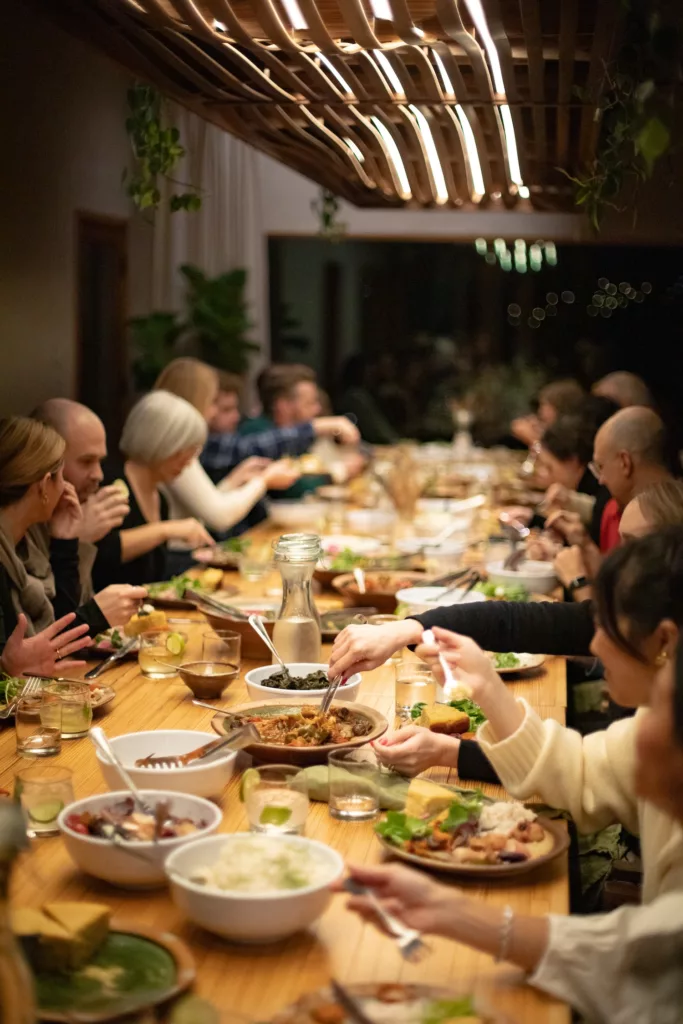
At Celeste Farms, family-style dining encourages connections and community.
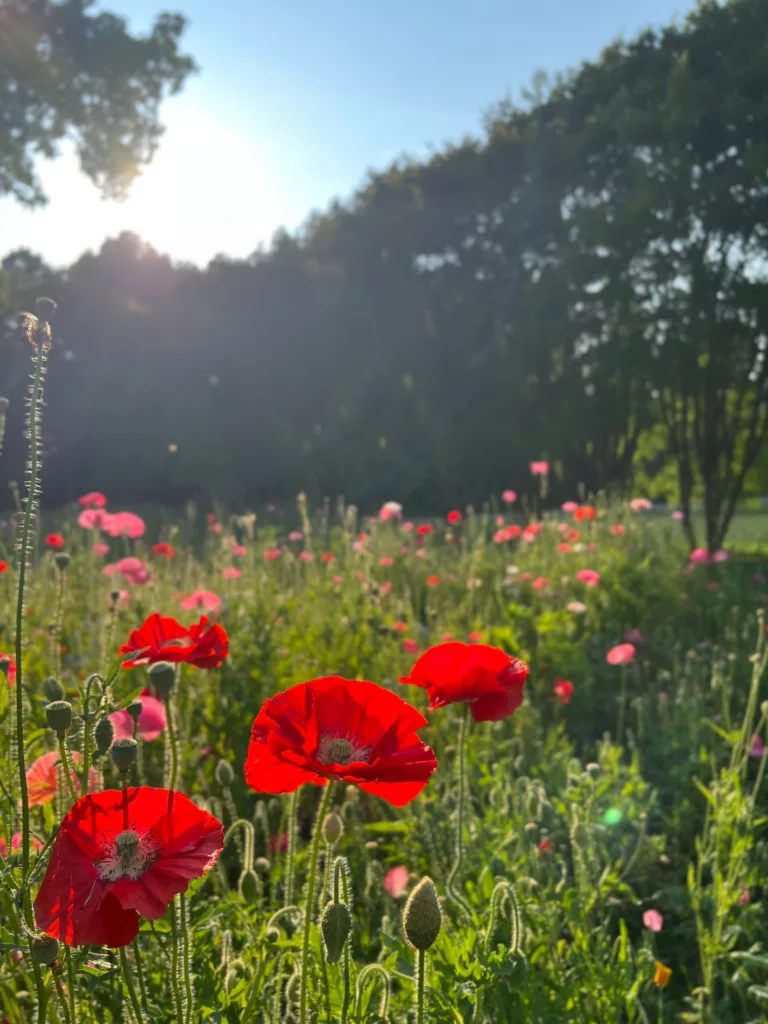
Colorful poppies in the field at Celeste Farms.
A Taste of Place
What better way to connect with your food than eating it a mere 20 feet from where it was grown? Under a wide-open, starlit sky, and softly glowing string lights, amid a riot of kaleidoscopic cosmos and zinnias—or whatever flowers are in season—guests at Celeste Farms gather around a long wooden table that seats 26. At one end, a custom wood-smoked grill sends up curls of fragrant smoke, the scent of charred herbs and seared meat mingling with the evening air. Sparks fly, wine flows, and the food—so fresh it’s never left the property—arrives on family-style serving platters, ready to be savored. Ninety-five percent of each meal’s components were harvested steps from where they now sit, some just hours ago.
The 4.3-acre farm turns out at least 96 crops a year from its 96-foot plant beds, raises 900 meat birds, and keeps a lively flock of laying hens for eggs. Arriving at one of these coveted farm dinners, guests take in a spellbinding scene—rolling fields bathed in sunset hues, a farmhouse tableau seemingly plucked from an impressionist landscape painting. Then, they settle in among strangers who soon, perplexingly, feel closer than that. Conversation and laughter rise and fall. Flavors linger. A sense of awe and curiosity hangs in the air—how do they do it?
And all of this, less than a 15-minute drive from downtown Richmond.
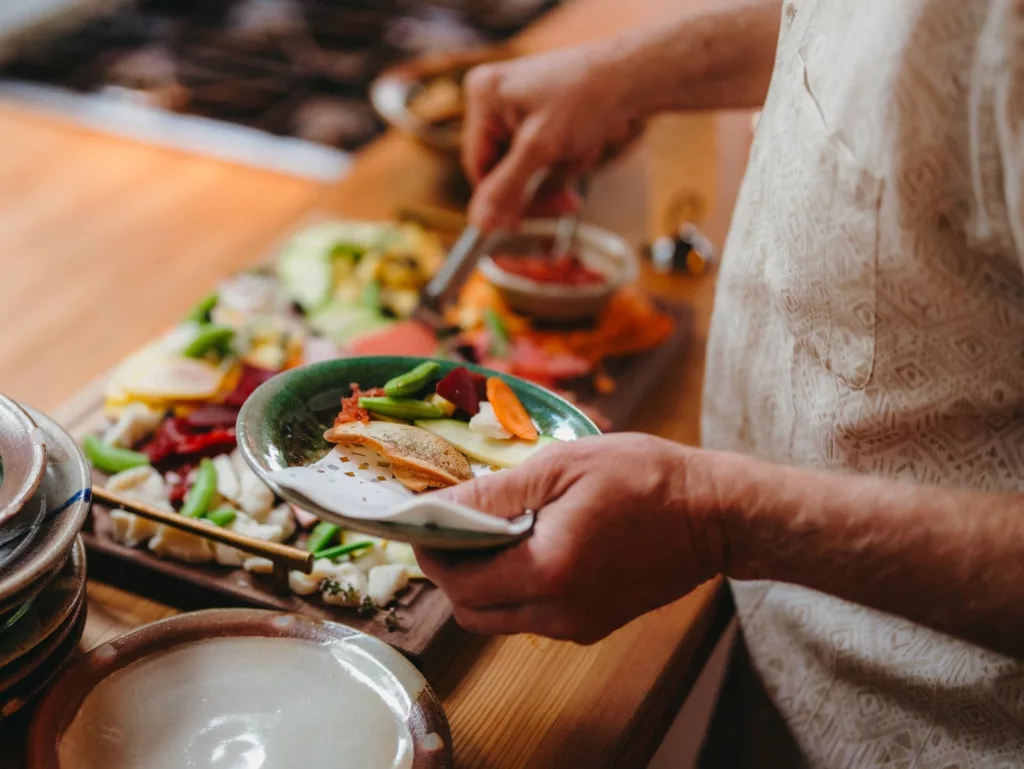
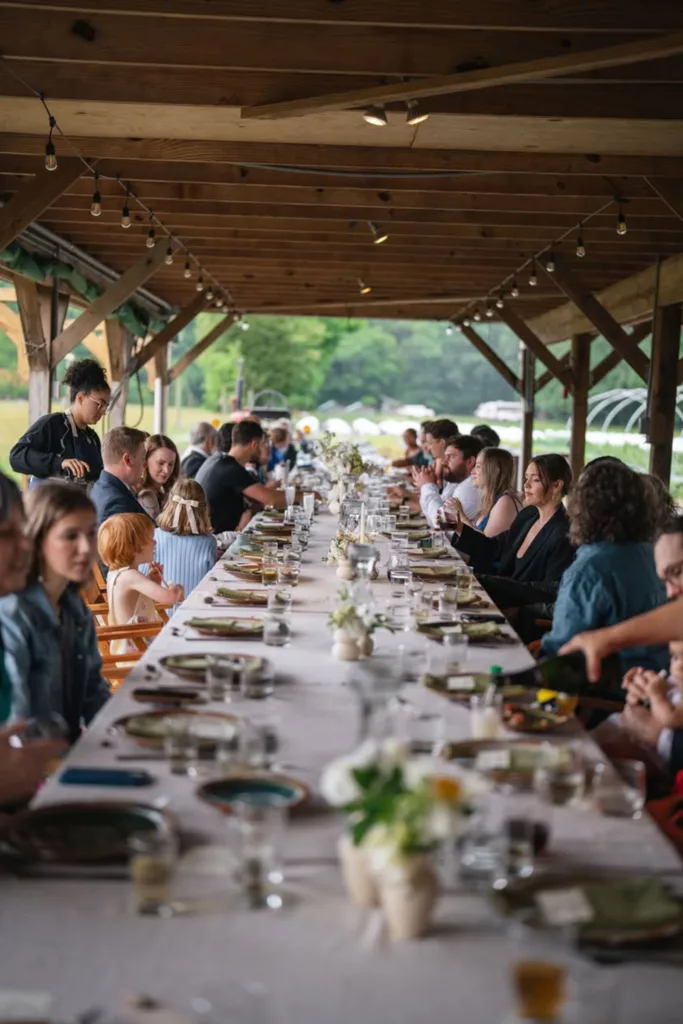
Guests at Celeste Farms’ sizeable farm table.
Fertile Ground
“A lot of folks who live in the city didn’t even know that these things were here—that they could cross over the hill and drift down into the countryside 10 minutes from downtown,” says Ashton Carter, chef at Celeste Farms, whose ability to cook with whatever the farm yields is akin to sorcery. “So, that’s usually the first shock.”
The next shock would be the small team who carries it all out—only two staff farmers.
“People will look at me like, ‘You guys are doing all this out here?’” says Karen Jaeger, head farmer at Celeste, who can attest to the difficulty of farm work, especially with the whims of inconsistent weather. “ There’s never any sitting still, really. We make a plan, and inevitably—pardon my language—it goes to shit.”
But the unpredictability, the constant evolution of the farm to meet the land and the community’s needs, is exactly what Jaeger loves most. “It follows a method of madness,” she says. “It’s not rote.”
Neither is the menu. With the farm’s seasonal rhythm—carrots, artichokes, peppers, watermelon, spinach—Carter selects ingredients from whatever Jaeger has available each week. Extras are sold to Ellwood Thompson’s, Leafy Lanes, Seasonal Roots, and even nearby school districts.
When it comes to cooking, Carter has a way of transforming even the most reviled vegetables into can’t-turn-down dishes. He once made a beet tres leches cake, using a classic base but infusing the milk soak with beet juice reduced into a simple syrup. The result was a stunning marbled effect of red, pink, and white.
“I usually see it with a bunch of dirt on it,” Jaeger laughs, thinking of the produce she pulls from the ground. “ But when I see his plated food, it’s so gorgeous. It’s like a work of art.”
“I kind of giggle when people say, ‘Can I get the recipe for that?’” Carter says. “There’s not a lot of recipe work. It’s just knowing what to do with the product and how to make it shine.”
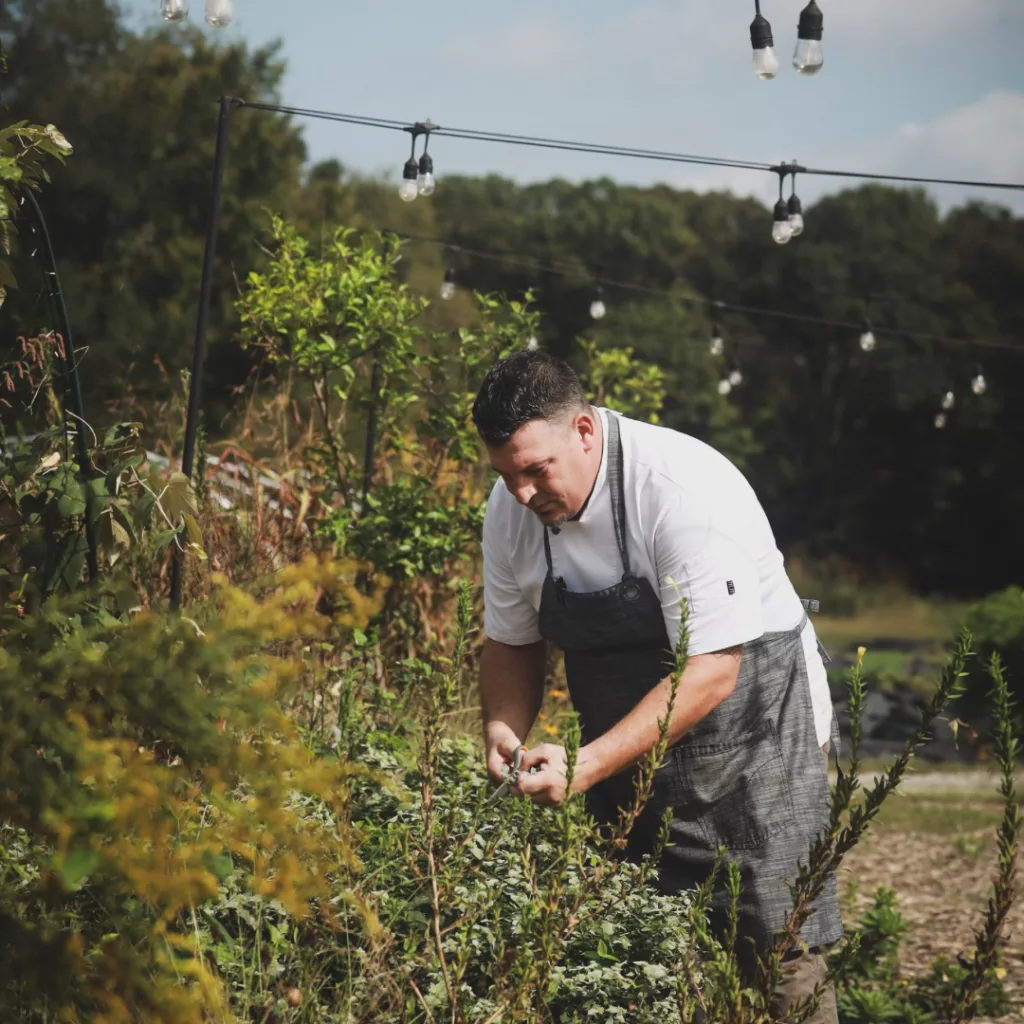
Chef Carter hunts for herbs right out of the garden.
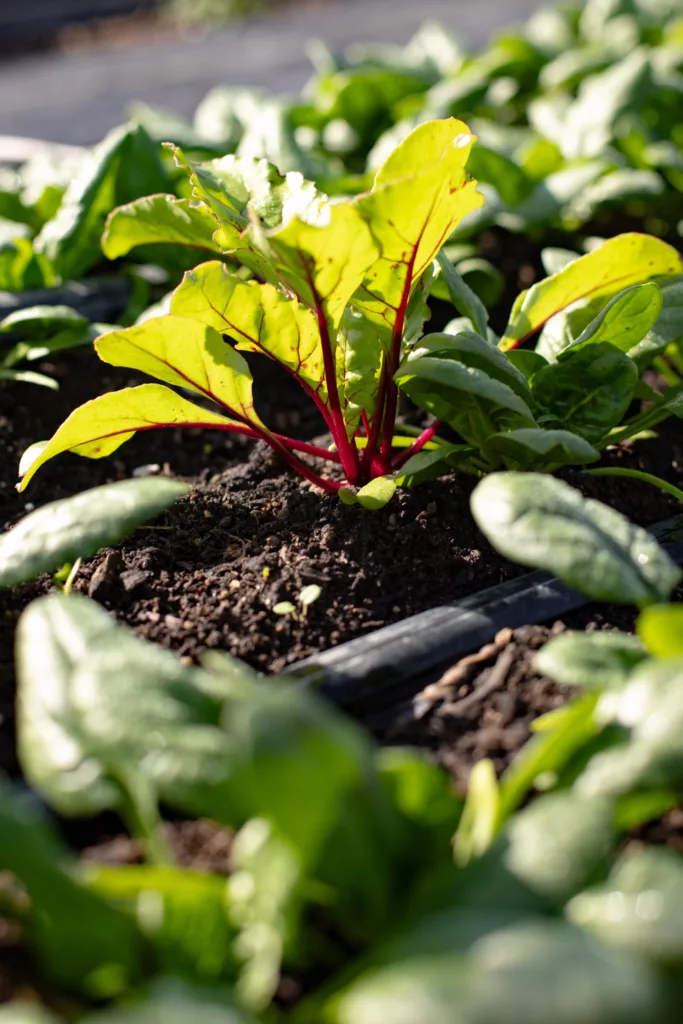
Beet greens sprouting in the garden.
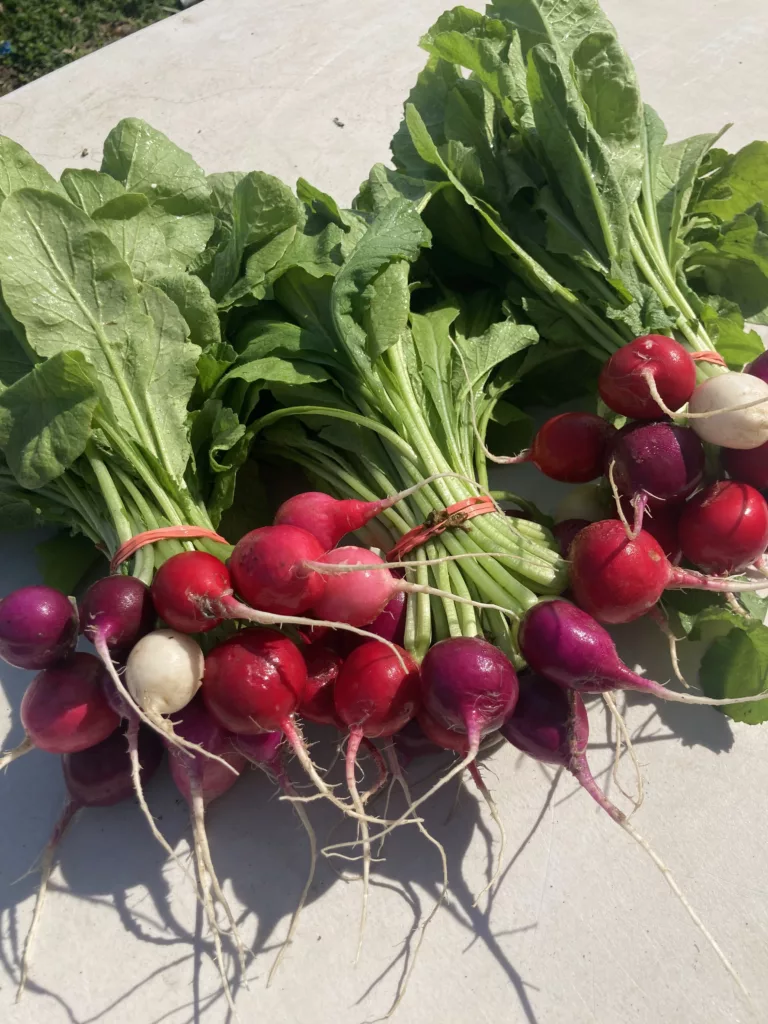
Celeste Farms’ impossiblly fresh radishes.
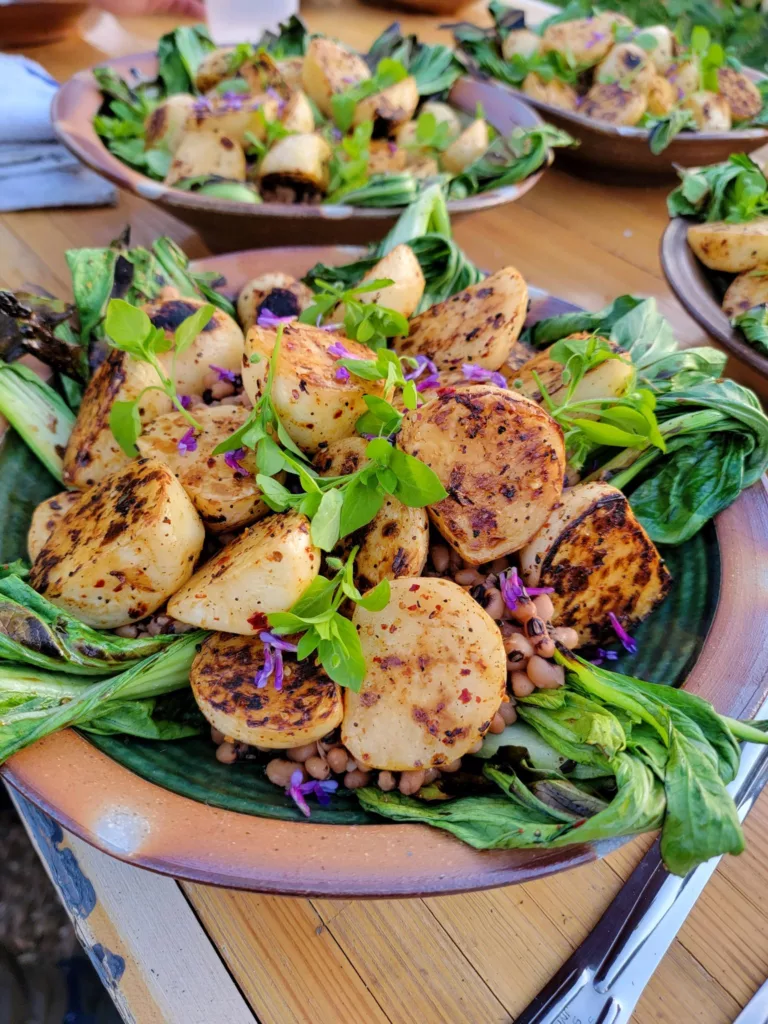
Farm-fresh salad straight from the garden.
Breaking Bread
Sometimes, the roots of community run even deeper than the crops.
The dinner experiences are designed to induce connection—from a 45-minute tour of the farm where guests familiarize with the land and the makers behind the meal, to a single communal table, to ongoing opportunities to stay involved, whether through Celeste’s Community Supported Agriculture program or volunteering in the fields.
“ I’ve learned that people really love to put their hands in the dirt and come out for an hour and socialize,” Jaeger says. “That’s something that people are, for whatever reason, drawn to.”
Community is one of the four pillars Newell built Celeste upon, along with single sourcing, preserving the rural environment, and providing a creative canvas for artists—whether that’s Carter in the kitchen or the local potters who craft the plates on which the food is served.
“So many times, strangers end up taking photos together or saying, ‘We’re going out for drinks after this,’” Newell says.
“ I think what we have become is a respite,” Jaeger adds. “ Taking people away from the hustle and bustle of their life and giving them a chance to chill out.” It’s a feeling that extends beyond the table, as Celeste has deepened its role as a retreat with the addition of the Field Spa, launched last fall, where guests can soak in a wood-fired hot tub, take a cold plunge, and warm up by the fire-pit, all while drinking in the bucolic scenery.
There’s something mysterious, and almost providential, in the air—or maybe in the food—at Celeste. Some perfect catalyst that slows time, sparks conversation, and draws people closer to each other and to the earth.
“I don’t know exactly what we’re doing, but we’re doing something right,” Newell says.
CelesteFarms.com
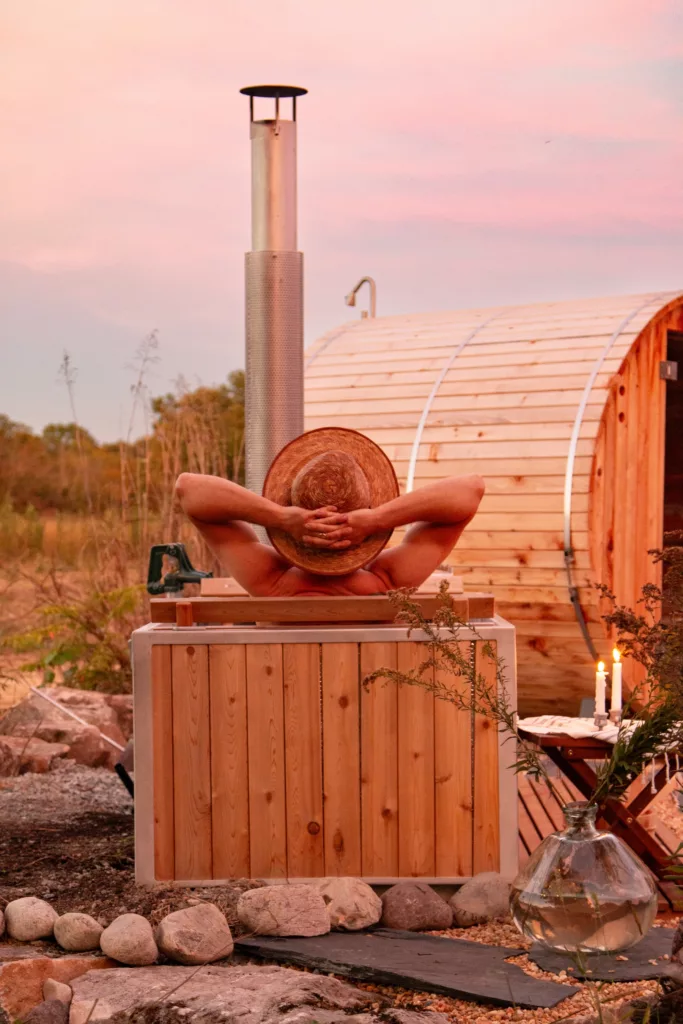
Relaxing in a wood-fired hot tub pairs perfectly with the bucolic scenery at Celeste Farms.
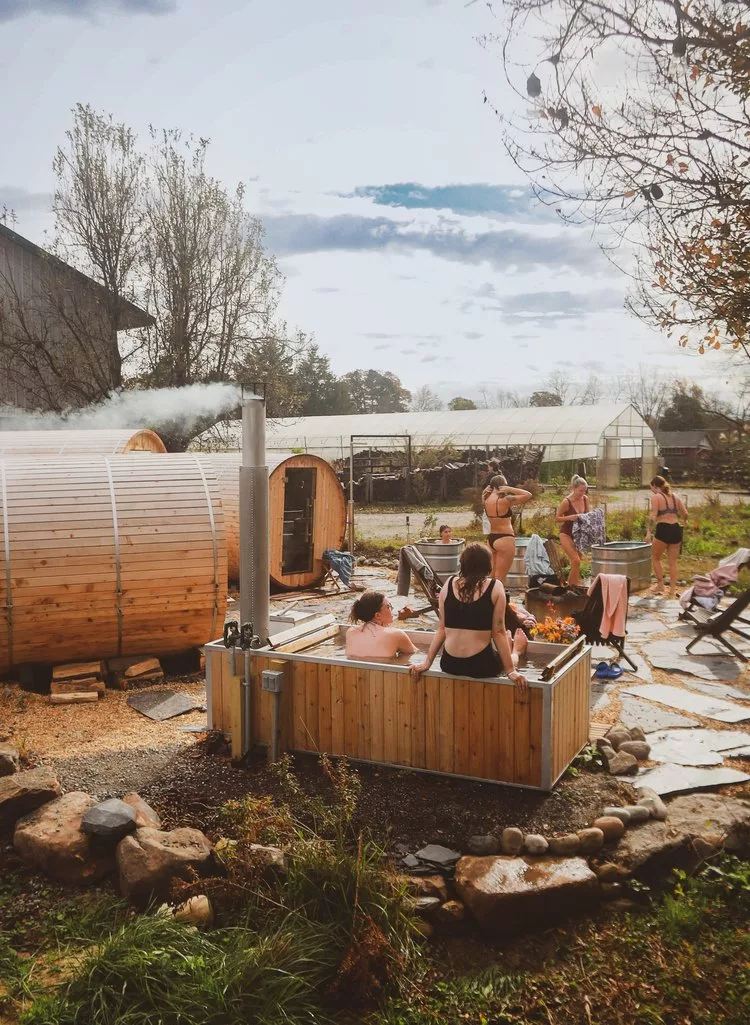
Ice baths, a hot tub, and saunas at Celeste Farms’ Field Spa.
Farm-Fresh Wellness
A dreamy spa in the fields of Celeste Farms blends fire, ice, and fresh air.
Connecting with the earth takes many forms— sinking your hands into warm soil, savoring the last scraps of a farm-fresh meal, or slipping into steamy water while bees hum nearby and the branches above bend heavy with fruit. At Celeste Farms, all of these paths to connection unwind before guests—maybe even all in the same day.
The farm’s Field Spa feels at once curiously out of place and perfectly at home. Three barrel-shaped wooden saunas encircle a firepit ring, mirrored by a triplet of aluminum ice baths on the other side. Simple rinse-off showers, a new bathhouse for changing and storing items, and a wood-fired hot tub tucked just adjacent complete the setting. With its quiet luxury and clean design, the space channels a kind of mystical Nordic calm—minimalist yet warm, and full of the simple joy Scandinavians call hygge.
There are several ways to experience the Field Spa. Communal offers a one-hour spa getaway to be enjoyed with friends or strangers, while Gather is a three-hour wellness social that includes a yoga class, spa time, and a farm-to-table picnic. On weekends, communal sessions are paired with a hearty, homegrown breakfast—every bit as special as one of the farm’s dinners. The spa area is also available for private events.

Pastoral Paradise: Getting There
Celeste Farms is a dining and wellness farm a mere six miles southeast of downtown Richmond. It’s just over the Henrico County line on scenic Osborne Turnpike, where the urban cityscape turns into verdant farmland. Check website for more info and pricing on field spa, CSA, farm, and dining experiences. Reservations are required and can be booked online. Visit CelesteFarms.com.
This article originally appeared in the June 2025 issue.
